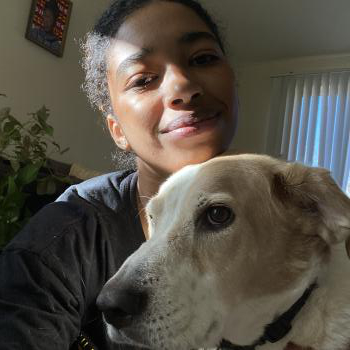On October 17th, 2019, the D.C. Council heard public comments on the Community Safety and Health Amendment Act of 2019. This was the first time in our nation’s history that a piece of legislation for the decriminalization of both the buying and selling of consensual sex reached a hearing. The air in the room that day was electric. No one would leave without being heard. Our message was simple: Sex work is work. The selling of sex is work that many people rely on to maintain their lives under a capitalist system that demands productivity as a condition of life. Like most labor under capitalism, sex work is performed for vast and intersectional reasons, including choice, coercion, and survival. And, like all laborers, sex workers need to pay rent, they need buy food, they need to survive.
The continued criminalization of sex work in the U.S. makes Black and brown women, girls, and trans and gender nonconforming folks unsafe. Ashanti Carmon, Leshai Mclean, Dee Dee Dodds, and Zoe Spears are just some of the women who have lost their lives because the conditions of racial capitalism, such as employment, housing discrimination, transphobia, and racism, make sex work one of the only options for earning a living. Criminalization means that sex workers are often at the mercy of the criminal justice system, which makes them more likely to be assaulted by police, to be locked in prisons and jails, and to lose access to stable housing, work, and wages. In her essay, “Cash/Consent,” the writer and sex worker Lorelie Lee argues: “When trading sex is made illegitimate, the people who do it are also made illegitimate. Criminalization increases barriers to safety in every form—housing, health care, child care and parental rights, and familial and social support. When we’re assaulted, under criminalization, we have to weigh the possibility that going to the police will mean being arrested. If we go to the police, they can refuse to investigate our rapes. Often the police themselves are our rapists.” Sex work, like sex, is not inherently dangerous; however, the criminalization of sex work makes sex work more dangerous. As is true of all criminalization tactics, the criminalization of sex work is also one of the primary sites of racial profiling and violence against Black and brown folk.
Protection Through Organizing, Advocacy, and Action
The Community Safety and Health Amendment Act was written by Sex Worker Advocates Coalition (SWAC), a collective of Black, queer, and trans sex workers and their allies. The bill would remove criminal penalties for prostitution while keeping in place all legislative measures that ban sex trafficking. I’m a member of SWAC through the DC Chapter of BYP100, a member-based organization of Black youth creating justice and freedom for all Black people. BYP100 organizes under a Black, Queer, Feminist (BQF) lens — “a political practice,” in the words of Charlene Carruthers, “through which people and groups seek to bring their full selves into the process of dismantling all systems of oppression.” We are an abolitionist organization, which means that we do not believe in jail and prisons as a means of justice, and we do not believe that the police keep us safe. We support policies that limit the interactions between the police and Black people, especially queer and trans folks; thus, we fight for the decriminalization of sex work.
The decriminalization of consensual sex work is fundamentally a labor issue; therefore, the decriminalization of sex work is another front in the fight to dismantle racial capitalism. Anti-blackness is not a result of capitalism but a constitutional condition. On the economic feeding chain of workers harmed by racial capitalism, sex workers who are Black and brown women, girls, and trans and gender nonconforming folks are at the bottom — consistently overlooked by the larger labor movement as a subject too hot to touch. Yet, again, sex work is work.
SWAC took on a legislative fight, but our goal was also to change the conservation around sex work through grassroots organizing. We knocked doors, we tabled, and we had conversations about the best ways to keep all community members, including sex workers, safe. This included hosting public forums and inviting our religious leaders to the table. Our organizing eventually drew the support of D.C. Councilmember David Grosso, who agreed to sponsor our bill. This was a major achievement but a small part of our demands of accountability from local officials.
The Fight Ahead
Opposition to the bill came primarily from white, liberal feminist organizations like the National Organization for Women and World Without Exploitation — organizations with liberal politics but for whom racial capitalism never enters their parlance. The white feminists present in D.C. on the day of the hearing largely opposed full decriminalization in favor of partial decriminalization, often referred to as the Nordic model, which even in its name disregards the existence of Black people. The Nordic model decriminalizes the selling of sex while keeping criminal penalities in place for the buying of sex. Unequivocally, the Nordic model does not work because to criminalize any part of sex work is to criminalize the work itself. A partial decriminalization is just that: incomplete. It’s a half measure that makes sex workers just as vulnerable to police assaults as any criminalization measure. The only way to enforce the Nordic model is through the justice system. And, in America, the police continue to be perpetrators of harm for Black folk. In a survey of New York City street-based sex workers, 27 percent of those interviewed reported experiencing violence at the hands of the police.
The argument for the prohibition of sex work follows no logical model and instead obfuscates the truth that the criminalization of sex work is based in puritanical morals and heteropatriarchal, anti-black norms. In the same article on cash and consent, Lee goes on to say: “When feminists call for the criminalization and delegitimization of sex work, they do not ally themselves with sex-working women. They actively create and cultivate a world in which sex-working women are culturally, legally, and visibly separated from women who do not trade sex.” When asked why they oppose the decriminalization of sex work, white feminists say they want to protect all women, including Black women, but Black women will never be safe in systems that depend on our abuse.
The D.C. Council took comments for 14 heated hours, and the racial antagonism that played out in the hearing room bears out Lee’s analysis. White women, especially white feminists, place themselves as the natural successors to the throne of patriarchy. With one hand they decry the actions of white men making decisions about women’s bodies and, with the other, they encourage legislation that would do the same. They will step on the bodies of Black women to do it.
A bill written for and by Black people was ultimately voted down by a group that was everything but. This is not an admittance of defeat. Instead, we must see opposition to this bill as what it plainly is: racism, the tendency of the establishment to maintain the status quo, which necessitates the marginalization and oppression of Black bodies because our forced labor is the machine that manufactures their wealth. BYP100 continues to fight for the protection of sex workers, and we will not stop until the world hears us. We continue calls for accountability by the police and public officials. You can learn more about our campaign on our website and take action by signing our petition, volunteering, and donating to our cause. After all, none of us is free unless all of us are free.

